The 2013 MacBook Air: Core i5-4250U vs. Core i7-4650U
by Anand Lal Shimpi on July 4, 2013 8:00 AM ESTBoot Performance
Although boot performance doesn't change substantially with the faster CPU, I did notice that the new system was posting better boot times than what I had previously recorded. My guess is all of my SSD torturing hadn't been TRIMed away before I presented the previous results. Either way the new MBA seems capable of a sub-12 second boot time. I even recorded some boots as low as 10.8 seconds. That PCIe SSD comes in handy for sure.
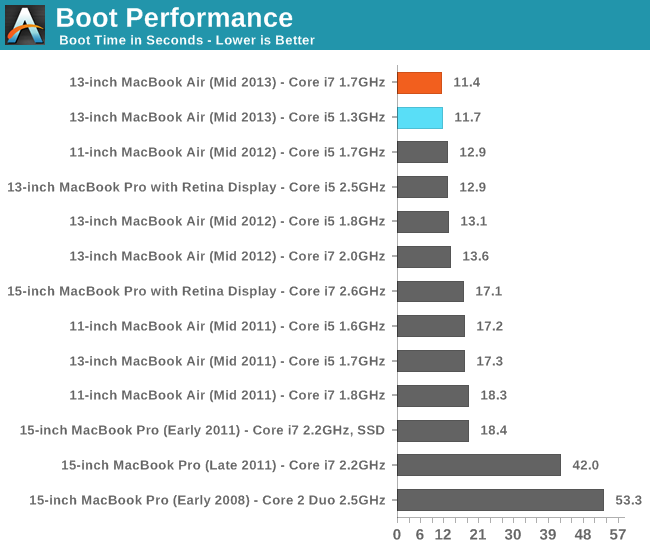
Single Threaded FP & 3D Rendering Performance
These next two charts look at single and multithreaded floating point performance using Cinebench 11.5. This test also gives us the rare opportunity of comparing to some older Mac Pro hardware as well from 2008 - 2010. Single threaded performance remains extremely important to overall system responsiveness, so it's always good to look at.
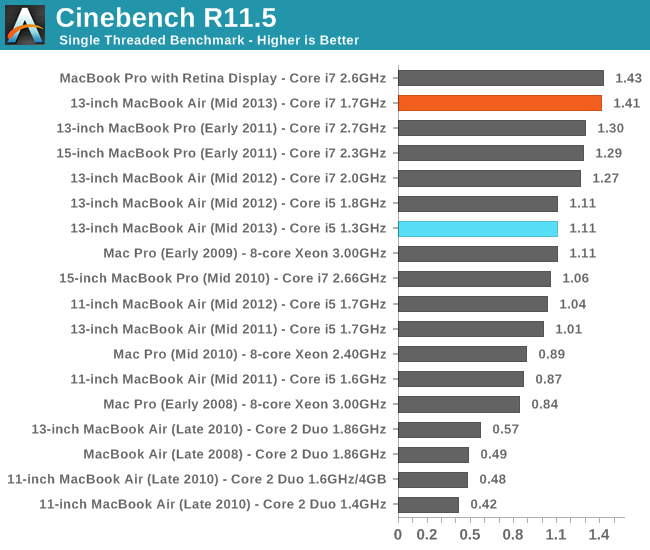
Oh man, the Core i7 upgraded seriously fixes everything. We get near perfect scaling here, showing a massive 27% increase in performance over the default Core i5 1.3GHz setup. The single threaded performance of the upgraded 13-inch MacBook Air is almost able to equal that of the 15-inch MacBook Pro with Retina Display. Anyone underwhelmed by Haswell should keep this in mind. What we're seeing here is a combination of IPC improvements and awesomely aggressive turbo, all within a 15W TDP.
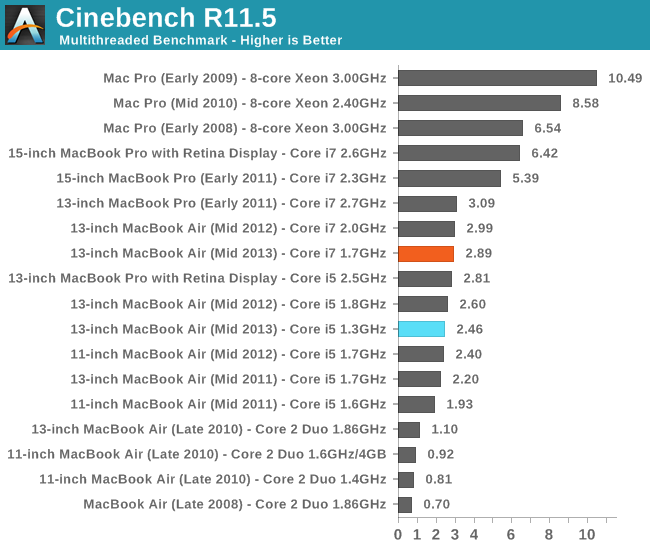
The multithreaded story is a bit less impressive, but still quite good. Showing a 17% increase in performance, the 1.7GHz Core i7 delivers nearly the same performance as the 2GHz Core i7 upgrade from last year's MBA. The rMBP15 distances itself from the MacBook Air though - there's no replacement for more cores.
Video Transcoding Performance
Video transcoding is really best suited for the higher end machines, but that doesn't change the fact that it's done on MacBook Airs as well. We'll start by looking at performance under iMovie. Here we're importing 1080p video from a Nikon D7000 and optimizing it during import.
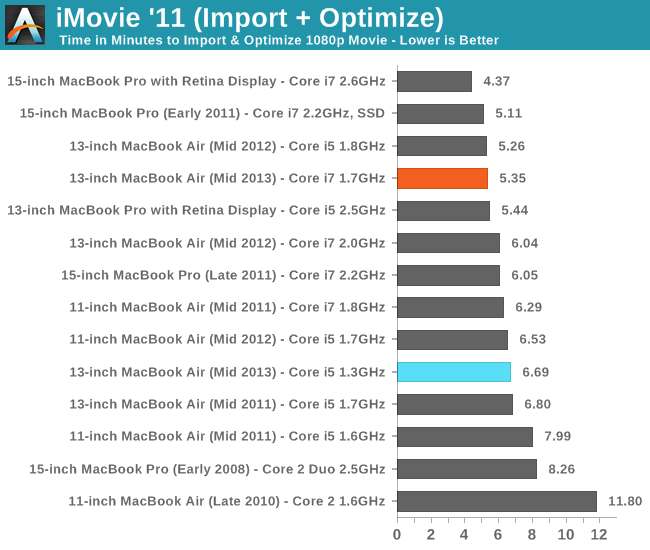
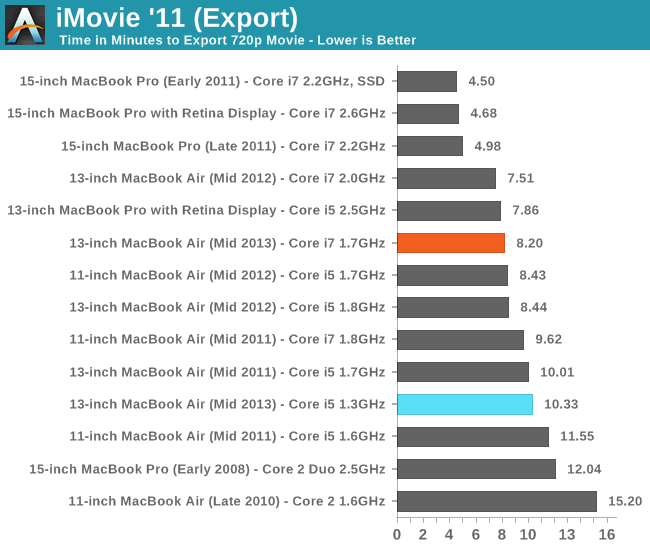
We're showing ~25% reductions in import and export time here over the base configuration. In both cases, performance equivalency with last year's upgraded configuration seems restored.
Final Cut Pro X falls on the professional end of the video production spectrum. The test file is the same here, but the workload is far more strenuous.
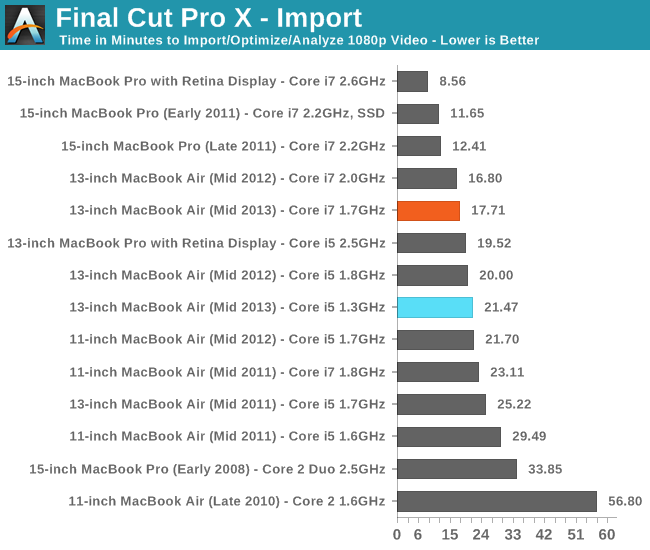
The same is true for our FCPX test. Last year's 2.0GHz model is about 5% quicker than this year's 1.7GHz Haswell ULT system, but obviously with the newer machine you get much better battery life. The improvement over the base CPU configuration is over 20% again.
Photo Editing & Export Performance
Our photo editing & export tests agree with what we've seen elsewhere. The gains here are north of 20% and put the i7 system within range of last year's 2GHz model.
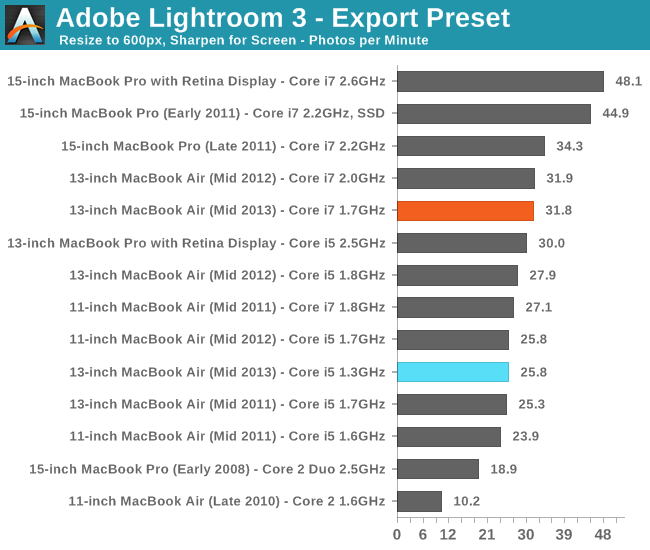
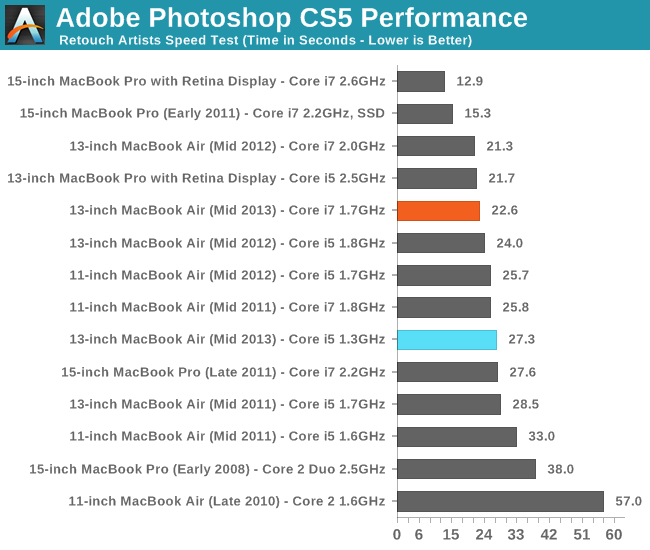
Xcode Performance
In our desktop review of Haswell I noted that performance in our compile test improved tremendously with the new architecture. As it's quite obvious that Haswell's IPC advantages don't surface all that much in our traditional suite, I wanted to see if perhaps things would be different in something that might lend itself better to Haswell's IPC improvements. I repeated our Firefox build test but under OS X. It's a multithreaded compile, with the number of threads set to 2x the number of cores (not threads) in a system.
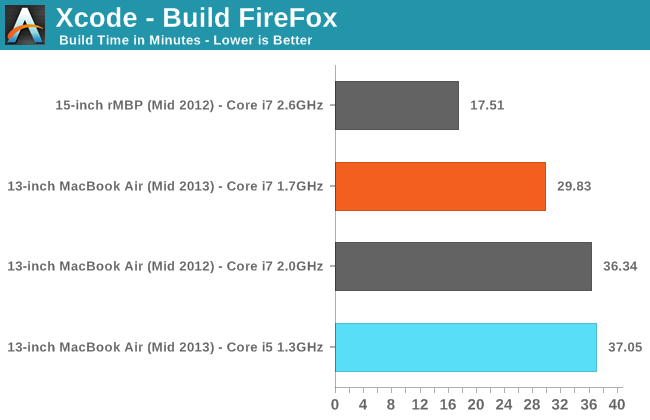
When Haswell's IPC advantage can shine, the higher clocked configuration does even more so. Here the 1.7GHz Core i7-4650U is over 20% faster than the fastest MacBook Air you could build last year. Serious developers will still want more cores but if you need ultimate portability, Haswell ULT really can shine.










127 Comments
View All Comments
Paapaa125 - Thursday, July 4, 2013 - link
You lack one kind of test:Test light/medium workload BUT equal the amount of work the units do. For example encode 2 hours of movies, reload the webpage 200 times and see the result. The workload is identical (i7 does it faster) and how does it affect the battery life?
Of course i7 uses more juice in heavy workload but it also accomplishes more. This is not necessarily fair.
lukarak - Thursday, July 4, 2013 - link
"What's important to note about all of these tests is that the amount of work done per cycle of the test doesn't vary based on performance. There's enough idle time baked in to make sure that the Core i7 based 13-inch MBA isn't artifically penalized by having to do more work than the i5 model simply because it's faster. "You obviously missed this?
Paapaa125 - Thursday, July 4, 2013 - link
Yes, I missed that. Very important correction, thanks! So i5 does more with the same battery life, just slower.ananduser - Thursday, July 4, 2013 - link
It doesn't do more. It does the same only slower. The i7 finishes the job faster and you pay a battery penalty for that, obviously.Paapaa125 - Friday, July 5, 2013 - link
Ok, let's sort this out. I was under impression that both computer do the same amount of work in same time? So if both ran a test for one hour, they accomplished the same thing?And as i5 can last longer than i7 in heavy load, it also can do more work, right?
ananduser - Friday, July 5, 2013 - link
Both kits are tested with the same amount of work. The i7 draws more power obviously but it also finishes its tasks faster than the i5. The i5 lasts longer but it also takes longer to finish the heavy load because it is slower.wallysb01 - Saturday, July 6, 2013 - link
Which shouldn't be too surprising, speed increases per Watt are not linear. I would have guessed in the sub 2.0GHz base clock rate range that it might be closer to linear than this showed though.Sugardaddy - Thursday, July 4, 2013 - link
That was a very good and informative article, thank you! Now if only we could get a review of the 28W Haswell chips!dineshramdin - Thursday, July 4, 2013 - link
It costs me around 140 bucks to upgrade my Core i7 CPU, which was pretty reasonable. However, i7-4650U includes a 8GB memory and the other one got one of 4GB, I guessAbelard - Thursday, July 4, 2013 - link
Those battery life figures are eye-poppingly good.